- Home
- Charles L. Grant
In the Mood - [Millennium Quartet 02] Page 2
In the Mood - [Millennium Quartet 02] Read online
Page 2
Inside, there was nothing. The TV was off. On the night-stand beside the double bed the clock radio was silent.
Nothing from the adjoining rooms, nothing from the hallway.
Only the voices.
Over a round darkwood table near the double bed, a hanging lamp dropped a faint spray of white, illuminating the table, its chair, and turning everything else to hulking shadow.
Only the voices.
* * * *
Thanks for taking the time to talk to me, Stan.
Yeah, right. Like I’ve got other appointments, huh?
You could have said no.
I could have said a lot of things, but it won’t make any difference. So, you going to let me see the ... whatever you call it?
The transcript?
Yeah. Sorry. I knew that. I just couldn’t think of it.
Sure, if you want. I don’t know if it’ll be done in time, though.
Breaks of the game. So what do you want to know?
Why you killed them.
That’s it? Boy, you don’t fool around.
What do you mean?
Half the people who come in here, they want to know if I hated my mother, if my father hit me, if I ran away from home a lot, things like that. It takes them forever to get to the good stuff.
I’ve already read the court transcripts, the police records, the profiles, and the evaluations. Not to mention the magazines and papers. I already know the answers, so why waste time and tape?
Because time, Mr. Bannock, is all I’ve got left. And not much of that, either.
Well, if you want to talk about them, be my guest. It’s your show.
It’s your book.
Whatever.
Okay. Hell, why not? No skin off my nose. No, I did not hate my mother. She did the best she could with what we had, which wasn’t much, but she tried. My father was pretty strict. He spanked me now and then, like maybe three, four times a year, but only when I did something really bad. You know, deliberately smashed something up, stuff like that. Other than that, it was just rules of the house, you know? Curfews, chores, things like that. He did right by us, me and my sister and my mother. I never ran away, I never screwed my sister, I don’t even remember getting detention more than once or twice.
Basically, an ordinary kid.
You got it.
So why did you kill those people?
You want to know the truth, I’ve been thinking a lot about that these past few years. It’ll sound funny, but the best thing I can come up with is—it seemed like a good idea at the time.
I don’t...wait a minute...maybe that’s the wrong question.
Nope, it’s right all right. I mean, what else matters? You want to know why, I told you why. It’s not all that complicated. I felt like it, that’s all.
Eight times?
Look, Mr. Bannock, you can believe me or not, I really don’t care. I felt like it. I did it. That’s about all it is.
* * * *
John stood in the bathroom, watching his reflection listen to the ghost. Stanley Arlington Hovinskal. A thirty-four-year-old man whose death-row cell had been vacated sixteen months ago. Nothing quite so dramatic as lights dimming or smoke drifting from beneath a specially made cap banded in iron or fingers convulsing or lips screaming.
He had died.
Period.
Only the voice remained.
* * * *
You look a little confused, Mr. Bannock.
I can’t help it, Stan, I’m sorry. You had a decent life, a decent job, you were getting ready to start a family, your fiancée had the wedding all planned...I’m sorry, but I just don’t get it.
Well... things change.
Forgive me, Stan, really, but... let’s face it, you pushed someone in front of a subway train in Washington, you cut the throats of three women and two men in the Midwest, you threw a teenager off a bridge in San Francisco, and you ran a traffic cop over four times with your car in Pennsylvania.
Yes. But it took me three years to do it all.
Is that important? The timing?
Ask the shrinks, Mr. Bannock, I wouldn’t know. You know, one of them actually said I had spells? Like I was some kind of old Southern lady with the vapors or something? Some kind of state, I don’t know what the word is.
Fugue.
Yeah, maybe. Another one, she wanted to tie it all up with the anniversaries of my parents’ deaths. Didn’t work. She had charts and everything, but she couldn’t make it work.
Stan, I—
Look, Mr. Bannock, there’s nothing all that complicated about this. I keep telling you. When I felt like it, I did it; when I didn’t, I didn’t.
No voices.
Nope.
No messages from another dimension.
God, no.
No seeing your parents’ faces superimposed over those of your victims.
Are you kidding?
No demons.
Stan?
Stan?
* * * *
John held his breath. The reflection cocked its head, waiting.
* * * *
Are you scared, Stan?
No, not really. Not of dying, if that’s what you mean. It’s going to happen, and nothing I can do is going to stop it. Before, I kind of was, when the appeals were going on. Not now, though. I’m not going to like it, I wish it wasn’t happening, I wish I could have more time to do things, but...you know. Price is price. I gotta pay it, no way around it.
But you are scared of something.
Oh yeah. Oh yeah.
You want to tell me what it is?
I don’t have to, Mr. Bannock. I think you already know.
* * * *
He exhaled loudly and lowered his head, hands braced on either side of the porcelain basin. A minute passed, and another, before he straightened and rolled his shoulders, feeling the joints pop softly. An unexpected yawn made him grin. His watch was in the other room, but he had a feeling it was close to midnight. He sniffed, rubbed his nose, and wondered if he was up for another ghost tonight.
This time he laughed aloud. Shortly. Sharply.
Hell, no.
Then maybe it was time to hit the downstairs bar before it closed. Something to help him sleep.
“Yeah,” he whispered. “Right.”
He stretched then, and strained to reach the ceiling with his fingers.
He almost made it.
He had always been tall, but never quite tall enough. Even in high school, the basketball players had tended toward giants, and he had never had enough weight to make it in football, or coordination for baseball. His hair was just long enough to cover his ears and his neck, dark hair flecked with early silver that seemed to sparkle in the right light, add years where they didn’t belong; stray waves in front refused to stay off his forehead. In college he had tried dramatics, his soft rasping voice an oddity there, but the first time they slapped a beard on, his thick eyebrows and deep eyes, the high cheeks and prominent nose, made him look like Abraham Lincoln.
It gave him “Prez” as a nickname that lasted all four years.
“Fourscore,” said the reflection.
“Up yours,” said John, gave the face a grin and a lazy two-finger salute, and walked into the other room, picked up his wallet and key from the low dresser, reached for the suit jacket thrown on the bedspread ... and stopped.
He stared at the tape recorder on the table.
That drink would be nice.
The company, even if it was only the bartender, would be nice.
But it wouldn’t be just one drink. The first, taken quickly, would choke him and water his eyes, hardly any taste at all; the second, sipped, but not too slowly, would eventually numb his throat; and he wouldn’t be able to keep track of those that followed. Certainly not the way he was feeling now. Certainly not if history were any kind of teacher at all.
With a grunt part relief, part regret, part sneering gratitude at this display of false strength, he dro
pped wallet and room key onto the bed and went to the window, pulled aside the drapes and looked out at the city, his hands still gripping the edges of the stiff cloth.
A few droplets shimmered on the wide pane, catching fragments of neon as they slipped down toward the sill.
He could see up a fair portion of Canal Street six stories below, watched a handful of pedestrians turn into the Quarter, watched two more leave, holding on to each other as they crossed the empty street. They were too small, however; they weren’t real, just clumsy clockwork figures that would vanish when he looked away. The Quarter itself was little more than a hazy glow that turned the buildings around it black.
You need sleep, Patty scolded gently from the farthest darkened corner. You’ll drop if you don’t rest.
“I don’t want to.” He let himself sag a little, and the drapes held him up when he tightened his grip.
You‘ve been here over a week, John. What are you trying to prove?
He didn’t answer. This particular ghost was his own, and she could read his mind. Always could. From the first day they had met, she had known more things about him than he thought he knew about himself.
Then what are you going to do? Stand there all night until you fall through the window?
He chuckled, but he didn’t move.
Come on, Ace, don’t be stupid. Not now.
She was right, of course. He did need the sleep, he did need the rest, he did need some time away from all those ghosts. A duck of his head and glance under his arm, and he saw the briefcase set beneath the table. It was filled with tapes, the tapes filled with voices, the voices filled with words that had once been his dream—to put them all down in a book.
Conversations with the Dead, some such nonsense like that. The title, like the purpose, had long since fallen behind.
But like Stan had said, it seemed like a good idea at the time.
Until, at last, he had actually listened to the words. Not heard them, not transcribed them, but listened.
Really listened.
John? John, honey, what’s the matter?
He looked down at the city, humidity blurring the lights, trails of aimless mist crawling across the river. The air conditioner kept the room cool, but now he felt cold.
A deep breath before he said, “I don’t know, Patty. I don’t know.”
* * * *
He stands at a crossroads in lower Custer County, right in the center of the intersection. He has never seen land so flat in his life. Two lanes in four directions all the way to the horizon a million miles away and nothing on them but dust drifting out of the fields, out of the roadside ditches, lazily swirling across the blacktop. The wind isn’t strong enough to lift it into clouds and not cool enough to dry the running sweat that stains his shirt. He knows he should be looking at horizon-deep corn waiting for the harvest; he knows he should be listening to the sound of giant machines that roll through the rows and take the stalks and swallow them; he knows there ought to be something out here but nothing.
There isn’t.
The corn, what’s left of it, what little has grown despite irrigation and prayers, is the color of the dust.
So is the sky.
So is the sun.
And the machines are still back in their sheds, in their barns, unused for the most part because there’s little for them to do.
But right now, in this place, he doesn’t care.
He’s waiting for his son.
His hands cup his mouth and he calls, “Joey!”
A crow answers.
“Joey!”
A wobbling dust dervish patters and dies against his leg.
“Joey!”
In the heat and the dry air his voice doesn’t carry.
He looks down all the roads, stares across the dead and dying fields, even checks the sky.
Damn, he thinks; how the hell can I find out—
He sees them.
Eastward, walking down the center line away from him— two figures, one not much taller than the other, holding hands, the shorter one every few steps playfully bumping into the other and dodging a playful slap.
He runs.
“Joey!”
Sweat blinds him and pebbles stab at his feet through the wafer soles of his worn shoes and the heat rests on his shoulders like a boulder made of cooling lava.
“Joey!”
They don’t turn, and they don’t get any closer.
This time, he swears to himself; this time I’ll get them, this time I’m not going to lose them, this time I’ll find out where the hell they’ve—
He runs.
“Joey!”
Two figures, black in the pale, hot sun, cutouts with legs and arms and heads and nothing else.
“Joey, damnit!”
A crow flies beside him, off his left shoulder. It’s joined by another on the right, and he feels like some World War Two bomber on a suicide mission, escorts on the wings, and that makes him run faster because these escorts, these crows don’t have the dead black eyes such birds usually had.
They’re blue.
Startlingly vivid, almost blinding blue.
“Joey!”
Silent wings.
Silent feet.
“Joey!” he cries.
And finally yells, “Patty, wait up, it’s me!”
While the crows with the live blue eyes edge closer, and begin to laugh.
* * * *
John opened his eyes and groaned at the sunlight that made him squint. He had forgotten to close the drapes last night, and a glance at the clock radio told him it was barely past dawn. He supposed he could get up, but there wouldn’t be much point. He had no desire to listen to the news this early in the day, and the hotel’s coffee shop wouldn’t be open yet.
More sleep would be the best thing, even if only for a couple of hours.
As he moved stiffly off the bed, he didn’t bother to dwell on the dream. He had it at least three times a week in one form or another for what seemed his whole life. Last night he had been in Nebraska; a couple of nights ago he had been in Montana; the time before that he had been standing in Times Square, and the crows had been two taxis with dead men at the wheels.
Blue-eyed dead men, who laughed just like his son.
Just like the crows.
“You’re cracking up, Ace,” he muttered as he yanked the drapes together, leaving nothing left but a dusty slant of sun that cut across the foot of the bed.
But he wasn’t crazy.
He knew it.
Cracking up would be too easy. In fact, it would be better if he did. That would make it all much more simple. Crazy equals safety. No one listens to a nut except other nuts. Safety in numbers.
He dropped back onto the bed, cupped his hands behind his head, and closed his eyes.
After a few moments, he began to laugh. Just a little. Deep in his throat.
At an image of his mother, standing on the back porch, hands on her skinny hips, glaring at him without anger, strands of graying hair dancing around her face, the face that eventually became his.
Good Lord in His fiery chariot, Johnny, she would say, what have you gotten yourself into now?
Fallen out of another tree while trying to swipe yet another apple; covered with smears and clots of weedy dirt like those creepy mud people in that old Flash Gordon movie; hair mussed and clothes ripped after wrestling with his friends; scraped and bruised after crawling through the drainpipes that burrowed under the road.
Nothing, Ma, he would answer lamely, and brace himself for when she would grab him by one ear, even when he was a teenager and taller by a head, and haul him inside, shove him toward the stairs with a sharp swat to his butt, and demand he clean himself up. Now. No arguments. Don’t let her see him again until he was decent.
And while you’re in the shower, John, pray that the Good Lord doesn’t ride that fiery chariot up your miserable excuse for a spine and leave tracks.
He would laugh then as he ran f
or his room, and he laughed now as he turned over and tucked his hands under the pillow.

![[Oxrun Station] The Orchard Read online](http://i1.bookreadfree.com/i/03/17/oxrun_station_the_orchard_preview.jpg) [Oxrun Station] The Orchard
[Oxrun Station] The Orchard![Riders in the Sky - [Millennium Quartet 04] Read online](http://i1.bookreadfree.com/i/03/20/riders_in_the_sky_-_millennium_quartet_04_preview.jpg) Riders in the Sky - [Millennium Quartet 04]
Riders in the Sky - [Millennium Quartet 04]![Chariot - [Millennium Quartet 03] Read online](http://i1.bookreadfree.com/i/03/19/chariot_-_millennium_quartet_03_preview.jpg) Chariot - [Millennium Quartet 03]
Chariot - [Millennium Quartet 03]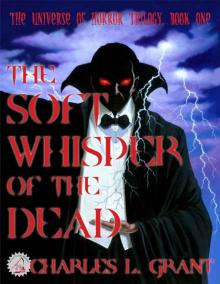 The Universe of Horror Volume 1: The Soft Whisper of the Dead (Neccon Classic Horror)
The Universe of Horror Volume 1: The Soft Whisper of the Dead (Neccon Classic Horror)![[Oxrun Station] Dialing The Wind Read online](http://i1.bookreadfree.com/i/03/19/oxrun_station_dialing_the_wind_preview.jpg) [Oxrun Station] Dialing The Wind
[Oxrun Station] Dialing The Wind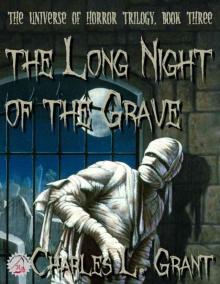 The Universe of Horror Volume 3: The Long Night of the Grave (Neccon Classic Horror)
The Universe of Horror Volume 3: The Long Night of the Grave (Neccon Classic Horror)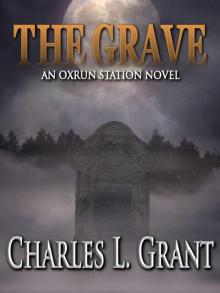 The Grave - An Oxrun Station Novel (Oxrun Station Novels)
The Grave - An Oxrun Station Novel (Oxrun Station Novels)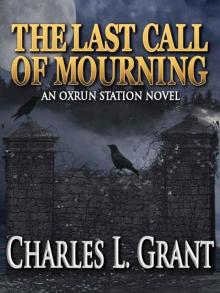 The Last Call of Mourning - An Oxrun Station Novel (Oxrun Station Novels)
The Last Call of Mourning - An Oxrun Station Novel (Oxrun Station Novels)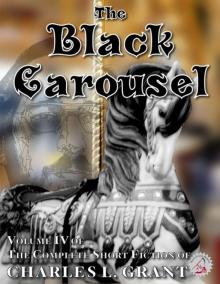 The Complete Short Fiction of Charles L. Grant, Volume IV: The Black Carousel
The Complete Short Fiction of Charles L. Grant, Volume IV: The Black Carousel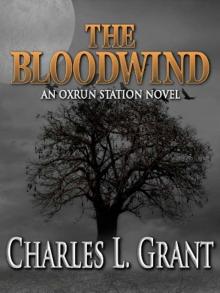 The Bloodwind - An Oxrun Station Novel (Oxrun Station Novels)
The Bloodwind - An Oxrun Station Novel (Oxrun Station Novels)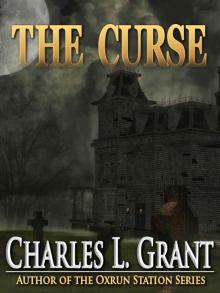 The Curse
The Curse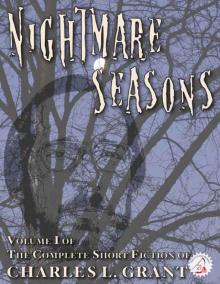 The Complete Short Fiction of Charles L. Grant Volume 1: Nightmare Seasons (Necon Classic Horror)
The Complete Short Fiction of Charles L. Grant Volume 1: Nightmare Seasons (Necon Classic Horror)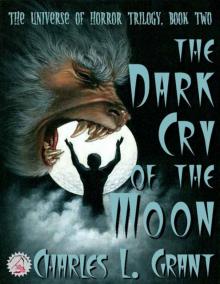 The Universe of Horror Volume 2: The Dark Cry of the Moon (Neccon Classic Horror)
The Universe of Horror Volume 2: The Dark Cry of the Moon (Neccon Classic Horror)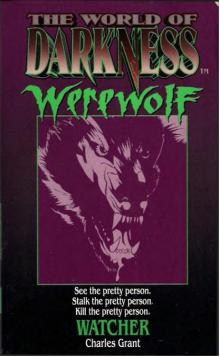 Watcher: Based on the Apocalypse (World of Darkness : Werewolf)
Watcher: Based on the Apocalypse (World of Darkness : Werewolf)![[Oxrun Station] The Bloodwind Read online](http://i1.bookreadfree.com/i/03/25/oxrun_station_the_bloodwind_preview.jpg) [Oxrun Station] The Bloodwind
[Oxrun Station] The Bloodwind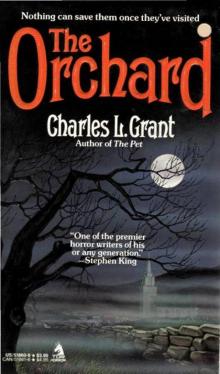 The Orchard
The Orchard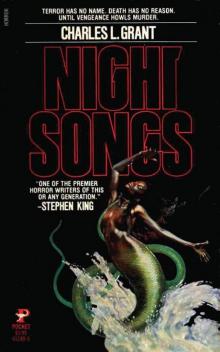 Night Songs
Night Songs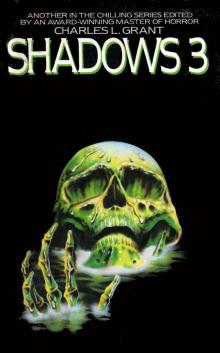 Shadows 3
Shadows 3![Symphony - [Millennium Quartet 01] Read online](http://i1.bookreadfree.com/i1/04/02/symphony_-_millennium_quartet_01_preview.jpg) Symphony - [Millennium Quartet 01]
Symphony - [Millennium Quartet 01] The Hour of the Oxrun Dead (Necon Classic Horror)
The Hour of the Oxrun Dead (Necon Classic Horror)![In the Mood - [Millennium Quartet 02] Read online](http://i1.bookreadfree.com/i1/03/31/in_the_mood_-_millennium_quartet_02_preview.jpg) In the Mood - [Millennium Quartet 02]
In the Mood - [Millennium Quartet 02]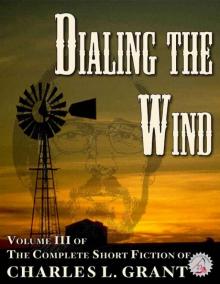 The Complete Short Fiction of Charles L. Grant Volume 3: Dialing the Wind (Neccon Classic Horror)
The Complete Short Fiction of Charles L. Grant Volume 3: Dialing the Wind (Neccon Classic Horror)![[Oxrun Station] The Last Call of Mourning Read online](http://i1.bookreadfree.com/i2/04/05/oxrun_station_the_last_call_of_mourning_preview.jpg) [Oxrun Station] The Last Call of Mourning
[Oxrun Station] The Last Call of Mourning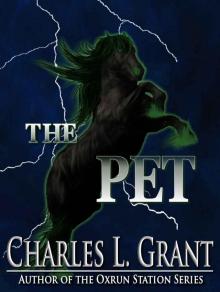 The Pet
The Pet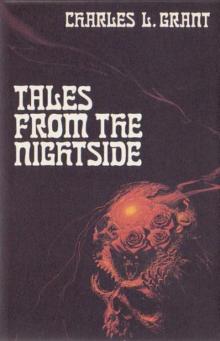 Tales from the Nightside
Tales from the Nightside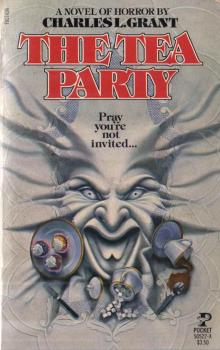 The Tea Party - A Novel of Horror
The Tea Party - A Novel of Horror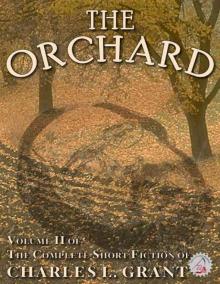 The Complete Short Fiction of Charles L. Grant Volume 2: The Orchard (Necon Classic Horror)
The Complete Short Fiction of Charles L. Grant Volume 2: The Orchard (Necon Classic Horror) Whirlwind
Whirlwind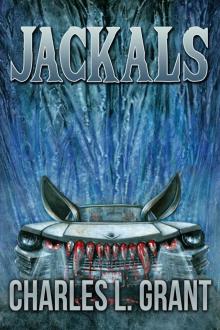 Jackals
Jackals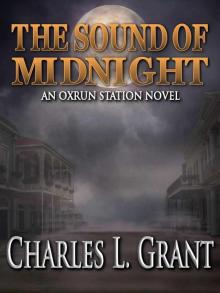 The Sound of Midnight - An Oxrun Station Novel
The Sound of Midnight - An Oxrun Station Novel